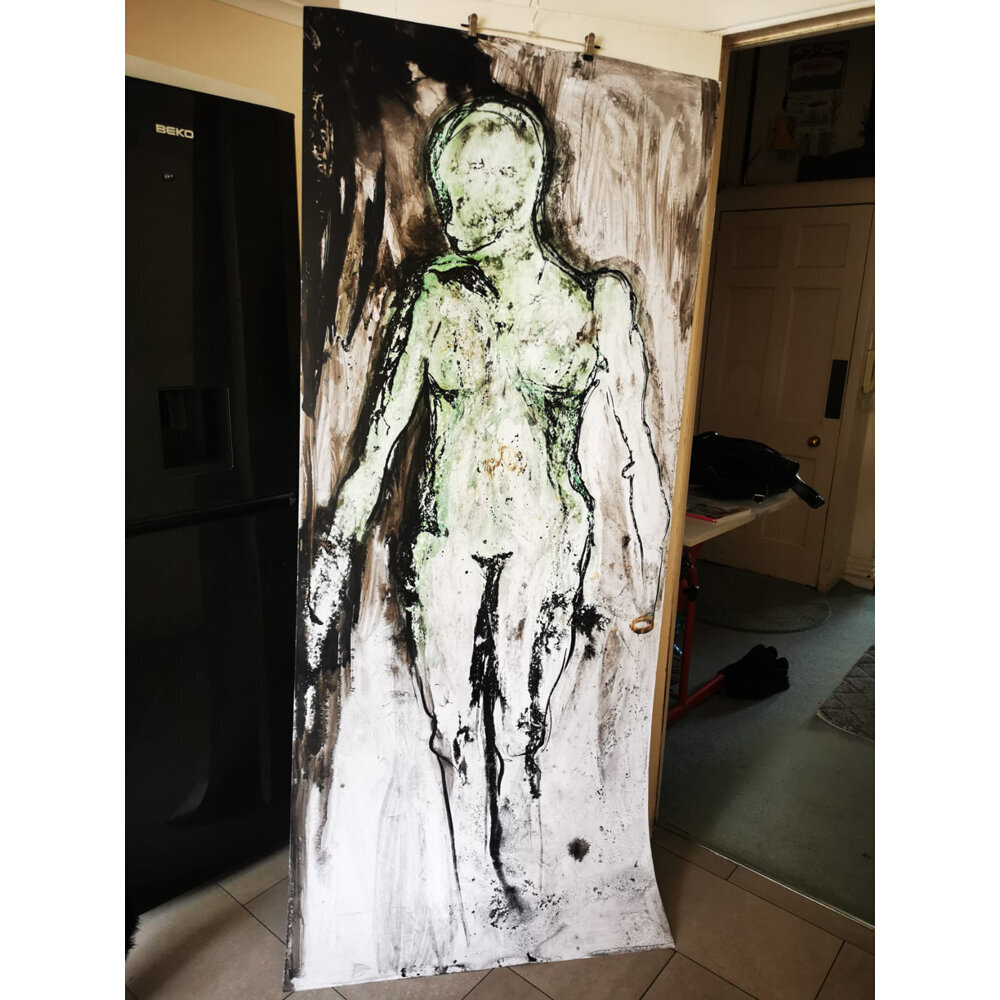Isla Jones
£0.00
Isla Jones' work situates the female body in nature; investigating ideas about identity and connection through vivid folkloric narratives and fictioned landscapes. In blurring lines between worlds, ideas about the body and its relationship to the environment are explored, creating a visual language that speaks to the universal human experience.
The body in turn becomes a space for continuous mutation and change; existing within nature, either as a hostile force or part of an ecosystem, and the focus is often on the undeniable correlations and reflections between the figure and its environment. Depictions of symbolic, unfamiliar landscapes and the rituals that exist within them make space for the body to be depicted unusually, characterised by a sense of transformation, fragmentation, and distortion. Figures are consistently close to nature, even if sometimes the landscape seems barren, empty or inhospitable. The world depicted embodies much of the same sickness and beauty as our own but displays it distinctly, perhaps even in a more tangible way.
Her work seeks to display a polarity of beauty and discomfort, using disparities between the comfortable and the unknown to create tension; here exists a sense of ambiguity, prompting the viewer to question their own perceptions and confront some of the more hidden aspects of the human experience.
Quantity:
Isla Jones' work situates the female body in nature; investigating ideas about identity and connection through vivid folkloric narratives and fictioned landscapes. In blurring lines between worlds, ideas about the body and its relationship to the environment are explored, creating a visual language that speaks to the universal human experience.
The body in turn becomes a space for continuous mutation and change; existing within nature, either as a hostile force or part of an ecosystem, and the focus is often on the undeniable correlations and reflections between the figure and its environment. Depictions of symbolic, unfamiliar landscapes and the rituals that exist within them make space for the body to be depicted unusually, characterised by a sense of transformation, fragmentation, and distortion. Figures are consistently close to nature, even if sometimes the landscape seems barren, empty or inhospitable. The world depicted embodies much of the same sickness and beauty as our own but displays it distinctly, perhaps even in a more tangible way.
Her work seeks to display a polarity of beauty and discomfort, using disparities between the comfortable and the unknown to create tension; here exists a sense of ambiguity, prompting the viewer to question their own perceptions and confront some of the more hidden aspects of the human experience.
Isla Jones' work situates the female body in nature; investigating ideas about identity and connection through vivid folkloric narratives and fictioned landscapes. In blurring lines between worlds, ideas about the body and its relationship to the environment are explored, creating a visual language that speaks to the universal human experience.
The body in turn becomes a space for continuous mutation and change; existing within nature, either as a hostile force or part of an ecosystem, and the focus is often on the undeniable correlations and reflections between the figure and its environment. Depictions of symbolic, unfamiliar landscapes and the rituals that exist within them make space for the body to be depicted unusually, characterised by a sense of transformation, fragmentation, and distortion. Figures are consistently close to nature, even if sometimes the landscape seems barren, empty or inhospitable. The world depicted embodies much of the same sickness and beauty as our own but displays it distinctly, perhaps even in a more tangible way.
Her work seeks to display a polarity of beauty and discomfort, using disparities between the comfortable and the unknown to create tension; here exists a sense of ambiguity, prompting the viewer to question their own perceptions and confront some of the more hidden aspects of the human experience.






